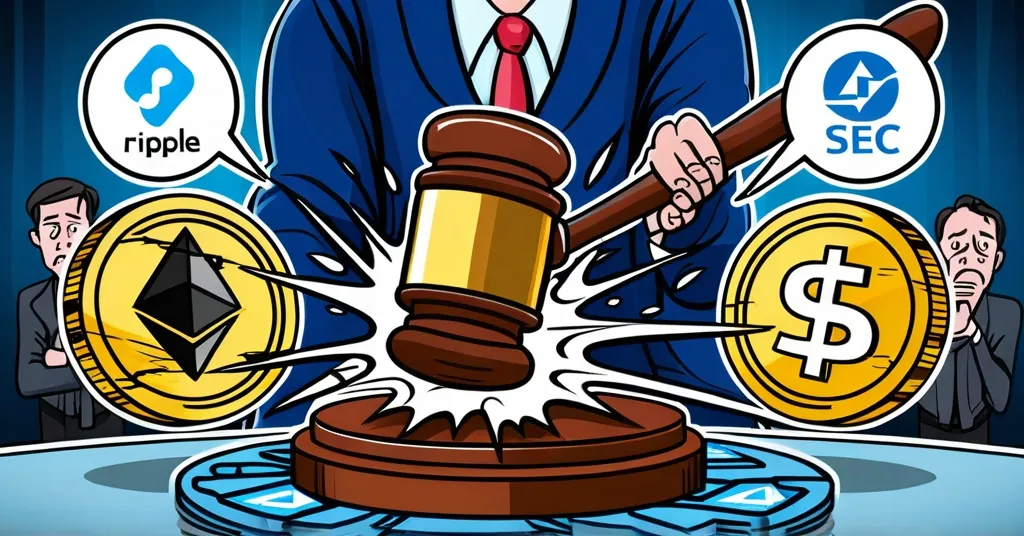Ripple’s Partial SEC Victory Fuels Crypto Regulation Debate

Ripple’s Legal Battle with SEC Sparks Debate on Crypto Regulation
In a landmark decision, Ripple’s legal battle with the U.S. Securities and Exchange Commission (SEC) has reshaped the future of XRP and ignited a fierce debate over the fairness and clarity of cryptocurrency regulation. Ripple’s partial victory in 2023 has left the industry grappling with the implications of the ruling and the broader regulatory landscape.
- Ripple partially won against SEC in 2023
- Confusion over XRP sales ruling
- SEC’s approach criticized for inconsistency
The Ripple SEC Ruling
In 2023, Ripple achieved a partial victory when the court ruled that sales of XRP on secondary markets were not securities, offering a glimmer of hope to the crypto community. However, the court also classified direct sales of XRP to institutional investors as securities transactions, a decision that has caused significant confusion. Securities are financial instruments like stocks or bonds, and institutional investors are large organizations such as banks or pension funds. This ruling has placed Ripple and other crypto companies in a confusing regulatory environment, where the application of traditional securities laws to cryptocurrencies remains murky.
Industry Reactions
The court’s decision triggered widespread criticism against the SEC, with many in the industry pointing out the regulatory body’s seemingly haphazard approach to cryptocurrency enforcement. The lack of clear guidelines has left companies like Ripple navigating a regulatory minefield blindfolded. Charles Gasparino, a FOX Business reporter, didn’t hold back in his critique of the SEC’s actions.
“I always thought the regulation of Ripple was just needless. Think about it, they were going after Ripple & XRP, while Sam Bankman-Fried was going nuts ripping people off.”
His comments underscore the perceived inconsistency in how the SEC handles different players in the crypto space, especially when compared to Ethereum, which has faced less regulatory scrutiny.
Implications for Crypto Regulation
Ripple’s case has broader implications for the entire cryptocurrency industry. The ruling highlights the urgent need for balanced regulations that protect investors without stifling innovation. The crypto world is a frontier town, where the promise of a financial revolution is met with the risks of regulatory shootouts. The SEC’s approach has been a regulatory rollercoaster, leaving companies like Ripple in limbo. This case also brings into focus the challenges of applying the Howey test, traditionally used for direct sales, to secondary market transactions, where buyers and sellers are often anonymous and not directly connected to the issuer.
The disparity in regulatory treatment between Ripple and Ethereum raises concerns about fairness. While Ripple faces intense scrutiny, Ethereum seems to have navigated the regulatory landscape with less friction. This inconsistency could impact investor sentiment and the future of other digital assets, as similar legal battles unfold in cases like SEC v. Coinbase and SEC v. Binance.
The Bigger Picture
Despite the regulatory challenges, there’s an undeniable optimism within the crypto community. Bitcoin maximalists and crypto enthusiasts see the potential for decentralized technologies to disrupt the status quo and empower individuals. Ripple’s case, while raising valid concerns, also underscores the resilience and adaptability of the crypto community. As champions of decentralization and privacy, we must remain vigilant against the dark sides of the industry, from scams to regulatory overreach.
The fight for the future of finance continues, with Ripple’s battle with the SEC being just one chapter. The broader narrative is about pushing the boundaries of what’s possible with blockchain technology, fostering effective accelerationism (e/acc), and ensuring that the revolution benefits all, not just the few. The global implications of regulatory uncertainty in the U.S. are pushing companies like Ripple to explore opportunities overseas, potentially shifting the center of blockchain innovation.
Key Questions and Takeaways
What was the outcome of Ripple’s legal battle with the SEC in 2023?
Ripple partially won its case, with the court ruling that XRP sales on secondary markets were not securities, but direct sales to institutional investors were classified as securities transactions.
Why has the Ripple vs. SEC case caused confusion in the cryptocurrency industry?
The case caused confusion due to the court’s decision to classify direct XRP sales to institutional investors as securities while deeming secondary market sales non-securities, highlighting regulatory inconsistencies.
What criticism did Charles Gasparino have regarding the SEC’s approach to Ripple?
Charles Gasparino criticized the SEC for its lack of clear guidelines and inconsistent regulatory approach, calling the treatment of Ripple illogical and unfair compared to Ethereum.
How does Ripple’s case reflect broader challenges in the cryptocurrency industry?
Ripple’s case reflects broader challenges by illustrating the difficulties crypto firms face in complying with unclear regulations and the need for balanced rules that protect investors while allowing innovation to thrive.
What disparities in regulatory treatment were highlighted in the article?
The article highlighted disparities in how Ethereum faced less regulatory scrutiny compared to Ripple, raising concerns about fairness in the SEC’s enforcement actions.
What does this mean for individual XRP holders?
For individual XRP holders, the ruling suggests that their purchases on secondary markets are not considered securities, potentially reducing the risk of regulatory action against them.
How might this influence other cryptocurrencies?
The Ripple ruling could set a precedent for other cryptocurrencies, particularly those involved in similar legal battles with the SEC. It may influence how digital assets are classified and regulated across the industry.
As we continue to report on the evolving crypto landscape, we remain committed to delivering the truth, the whole truth, and nothing but the truth. From the potential of Bitcoin to the nuances of altcoins and other innovative protocols, we’re here to guide you through the financial revolution, no bullshit included.



